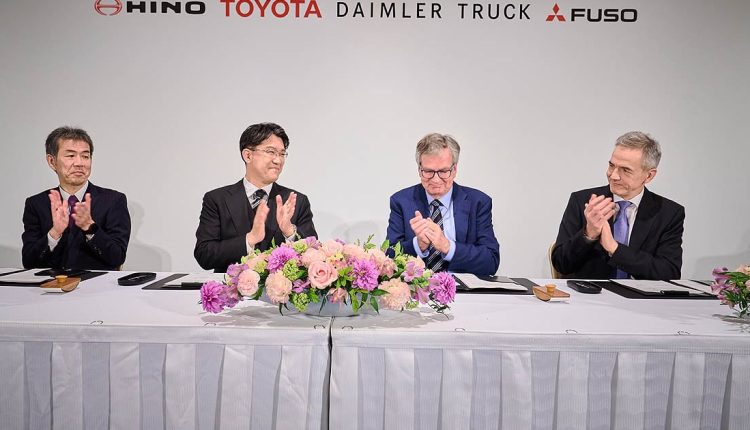TOKYO — Toyota plans to merge its troubled truck-making subsidiary Hino Motors with its Daimler-owned heavy truck rival Mitsubishi Fuso to jointly develop advanced technologies.
The basic agreement, announced Tuesday, will form a merger on “equal footing,” parent companies Toyota Motor Corp. and Daimler Truck Holding AG said in a joint statement.
Hino Motors and Mitsubishi Fuso Truck and Bus Corp. will collaborate on commercial vehicle development, procurement and production to form a “globally competitive” Japanese truck maker, the four companies said. Southeast Asia will be a particular focus of joint operations.
Toyota and Daimler will invest equally in the holding company of the merged truck makers and support the development of hydrogen, autonomous, connected and electrified technologies.
“Behind this collaboration is our four companies’ strong desire to create the future of commercial vehicles together,” Toyota CEO Koji Sato said at a Tokyo news conference.
The shuffle comes as Toyota’s Hino digs out of an embarrassing emission and fuel efficiency scandal and as Daimler looks to streamline its commercial truck holdings. Daimler separated its truck and car units in 2021 as part of a wider industry trend of spinning off commercial vehicles.
Nissan sold its truck subsidiary to Volvo in 2007, Volkswagen renamed its truck and bus unit Traton in 2018 and listed it on the Frankfurt and Stockholm stock exchanges the following year.
Hino fell into trouble in March 2022 with the revelation it had been falsifying emissions and fuel economy data dating as far as 2003. The scandal snowballed later that year when Hino said new problems were discovered in a light-duty engine, among revelations in other power plants.
By joining forces, Hino and Mitsubishi Fuso will “create synergies and enhance the competitiveness of Japanese truck manufacturers, helping to strengthen the foundation of the Japanese and Asian automotive industries,” the companies said in their statement.
Commercial vehicles account for about 40 percent of global automotive carbon dioxide emissions, and the tie-up will speed the shift toward carbon neutrality, Sato said.
“The gathering of our four companies will open new possibilities for the future,” he said.
Details of the merger, including the scope of cooperation, as well as its name, shareholding ratio and holding company structure, will be decided over the next 18 months, the companies said. They want a definitive agreement in the first quarter of 2024 and close by the end of next year.
“Simply put, the world is changing, and our industry needs to change with it,” Mitsubishi Fuso CEO Karl Deppen said. Daimler took a stake in Mitsubishi Fuso in 2003 and now owns 89 percent.
Toyota bought a controlling stake in Hino in 2001, making it a wholly owned subsidiary.
In 2021, Japan’s top automaker created a nationwide commercial vehicle consortium of Toyota-affiliated companies to speed the shift to electrification.


